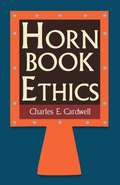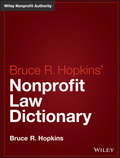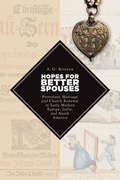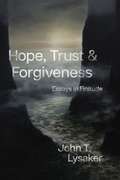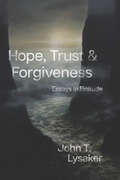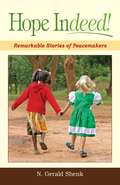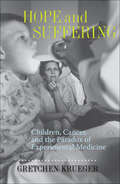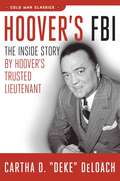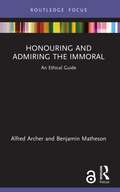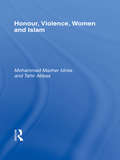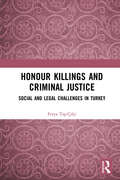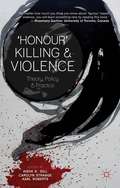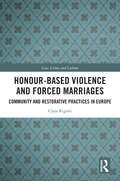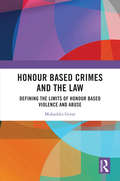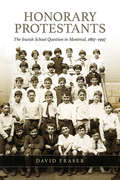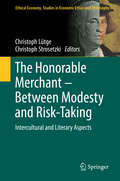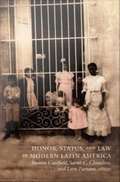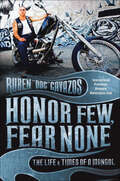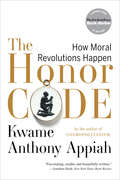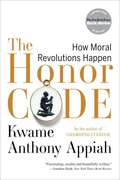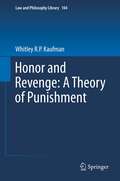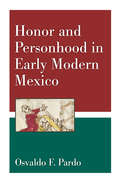- Table View
- List View
Hornbook Ethics
by Charles CardwellFocusing on basics--including those critical thinking skills that make philosophical ethics possible--Hornbook Ethics aims to help students understand, analyze, and evaluate both philosophical work in ethics and real-life ethical problems.
Hopkins' Nonprofit Law Dictionary (Wiley Nonprofit Law, Finance and Management Series)
by Bruce R. HopkinsA focused, invaluable guide to nonprofit legal terminology and definitions The Bruce R. Hopkins Nonprofit Law Dictionary is a thorough professional reference for the terminology and definitions surrounding the law of tax-exempt organizations. Author Bruce R. Hopkins, the country's leading expert in nonprofit law, draws upon 45 years of practice to deliver a true dictionary reference for attorneys specializing in nonprofit law and tax law. The book's terminology and definitions are derived from constantly changing statutes, government agency regulations and rulings, court opinions, and government forms and instructions, with citations provided where appropriate. Modeled after a conventional dictionary, this book offers quick navigation to the information of interest, and points you toward the other Hopkins guides that provide more in-depth information should you require it. The devil is in the details, and nowhere is that statement truer than in the legal profession. Incorrect interpretation of a single phrase can cause consequences for both client and attorney, and verbiage may be intentionally vague with unexpectedly broad or narrow definitions. This guide gives you the most commonly accepted interpretations of terminology related specifically to nonprofit law, so you can feel confident in the quality of service you provide to your clients. Stay up to date on the latest in nonprofit law Confirm the accepted definitions of legal terms and phrases Learn where to turn for deeper guidance on specific topics Gain expert insight into obscure and complex definitions Stop spending time wading through textbooks and case law, only to wonder whether or not the information you eventually found applies to nonprofit law in the same way. Focused specifically on the law as it applies to the nonprofit sector, the Bruce R. Hopkins Nonprofit Law Dictionary is an indispensable reference that gives you the information you need quickly and easily.
Hopi Ethics: A Theoretical Analysis
by Richard B. BrandtThis book is the final product of a study which began, early in 1945, as a survey of the implications for moral philosophy of knowledge about primitive peoples.
Hopes for Better Spouses: Protestant Marriage and Church Renewal in Early Modern Europe, India, and North America (Emory University Studies in Law and Religion (EUSLR))
by A. G. RoeberModern Protestant debates about spousal relations and the meaning of marriage began in a forgotten international dispute some 300 years ago. The Lutheran-Pietist ideal of marriage as friendship and mutual pursuit of holiness battled with the idea that submission defined spousal roles.Exploiting material culture artifacts, broadsides, hymns, sermons, private correspondence, and legal cases on three continents -- Europe, Asia, and North America -- A. G. Roeber reconstructs the roots and the dimensions of a continued debate that still preoccupies international Protestantism and its Catholic and Orthodox critics and observers in the twenty-first century.
Hope, Trust, and Forgiveness: Essays in Finitude
by John T. LysakerA new ethics of human finitude developed through three experimental essays. As ethical beings, we strive for lives that are meaningful and praiseworthy. But we are finite. We do not know, so we hope. We need, so we trust. We err, so we forgive. In this book, philosopher John T. Lysaker draws our attention to the ways in which these three capacities—hope, trust, and forgiveness—contend with human limits. Each experience is vital to human flourishing, yet each also poses significant personal and institutional challenges as well as opportunities for growth. Hope, Trust, and Forgiveness explores these challenges and opportunities and proposes ways to best meet them. In so doing, Lysaker experiments with the essay as a form and advances an improvisational perfectionism to deepen and expand our ethical horizons.
Hope, Trust, and Forgiveness: Essays in Finitude
by John T. LysakerA new ethics of human finitude developed through three experimental essays. As ethical beings, we strive for lives that are meaningful and praiseworthy. But we are finite. We do not know, so we hope. We need, so we trust. We err, so we forgive. In this book, philosopher John T. Lysaker draws our attention to the ways in which these three capacities—hope, trust, and forgiveness—contend with human limits. Each experience is vital to human flourishing, yet each also poses significant personal and institutional challenges as well as opportunities for growth. Hope, Trust, and Forgiveness explores these challenges and opportunities and proposes ways to best meet them. In so doing, Lysaker experiments with the essay as a form and advances an improvisational perfectionism to deepen and expand our ethical horizons.
Hope Indeed: Remarkable Stories Of Peacemakers
by N. ShenkGerald Shenk has traveled to and lived in many difficult places. He goes to teach-and to spot people who act out of hope. When he began to feel fortified by what he discovered, even foolishly rich, he wrote what he had witnessed and heard for the rest of us. Hope Indeed! is his collection of stories of stunningly ordinary people behaving with extraordinary hope. Here are the stories of- Ned Wyse, a farmer/pastor in Michigan, chosen randomly for a violent beating by some neighborhood kids, and what he did about it. The Palestinian parents who gave their young murdered son's organs to ill Jewish children. The Amish, who subverted the vicious violation of their innocent children in the Nickel Mines school by refusing to multiply the horror, and instead offered forgiveness and generosity. Jewish Cantor Michael Weisser and his family who took carry-out food to the white supremacists who had harassed them mercilessly. The German Lutheran pastor couple who offered their home to recently desposed and homeless Erich Honecker, who had ruthlessly ruled East Germany. Brother Ivo who kept bringing former Catholic and Muslim neighbors together as war escalated in Bosnia. Says Shenk, "Here are stories to rehearse if we want to become people who subvert vengeance with kindness."
Hope and Suffering: Children, Cancer, and the Paradox of Experimental Medicine
by Gretchen KruegerGretchen Krueger's poignant narrative explores how doctors, families, and the public interpreted the experience of childhood cancer from the 1930s through the 1970s. Pairing the transformation of childhood cancer from killer to curable disease with the personal experiences of young patients and their families, Krueger illuminates the twin realities of hope and suffering. In this social history, each decade follows a family whose experience touches on key themes: possible causes, means and timing of detection, the search for curative treatment, the merit of alternative treatments, the decisions to pursue or halt therapy, the side effects of treatment, death and dying—and cure. Recounting the complex and sometimes contentious interactions among the families of children with cancer, medical researchers, physicians, advocacy organizations, the media, and policy makers, Krueger reveals that personal odyssey and clinical challenge are the simultaneous realities of childhood cancer. This engaging study will be of interest to historians, medical practitioners and researchers, and people whose lives have been altered by cancer.
Hoover's Fbi: The Inside Story By Hoover's Trusted Lieutenant (Cold War Classics Ser.)
by Cartha D. DeLoachThe FBI is the world's most famous law enforcement agency and also one of the world's most mysterious organizations. Only the few who were part of J. Edgar Hoover's inner circle know the truths of five decades of his authoritarian rule. In this gripping personal account, Deke DeLoach, who was privy to Hoover's thoughts and actions during the FBI's most tumultuous years, tells his insider story.
Honouring Social Justice
by Margaret E. BeareHonouring Social Justice brings together a diverse group of leading legal scholars, criminologists, and sociologists to study numerous contemporary social justice issues. In doing so, the contributors to this collection present a thorough and multifaceted portrait of recent successes and challenges of the criminal justice systems in Canada and elsewhere.Examining a broad range of vital contemporary social, judicial, and political issues, the essays in this volume pursue topics such as the targeting of marginalized groups, wrongful convictions, gender-based bias in law, government accountability, and inequalities in the application of the law to ethnic and socio-economic groups. These essays provide an illuminating introduction to the background of important social causes, and describe dedicated examples of how to effectively champion calls for social justice.Written to honour the life and work of the late Dianne Martin, a renowned scholar, lawyer, and social activist, Honouring Social Justice is an engaging and inspired series of accounts on how to improve society by leading experts from across the country.
Honouring and Admiring the Immoral: An Ethical Guide (Routledge Focus on Philosophy)
by Alfred Archer Benjamin MathesonIs it appropriate to honour and admire people who have created great works of art, made important intellectual contributions, performed great sporting feats or shaped the history of a nation if those people have also acted immorally? This book provides a philosophical investigation of this important and timely question. The authors draw on the latest research from ethics, value theory, philosophy of emotion, social philosophy and social psychology to develop and substantiate arguments that have been made in the public debates about this issue. They offer a detailed analysis of the nature and ethics of honour and admiration, and present reasons both in favor and against honouring and admiring the immoral. They also take on the important matter of whether we can separate the achievements of public figures from their immoral behavior. Ultimately, the authors reject a "one-size-fits-all" approach and argue that we must weigh up the reasons for and against honouring and admiring in each particular case. Honouring and Admiring the Immoral is written in an accessible style that shows how philosophy can engage with public debates about important ethical issues. It will be of interest to scholars and students working in moral philosophy, philosophy of emotion, and social philosophy.
Honour, Violence, Women and Islam
by Mohammad Mazher IdrissWhy are honour killings and honour-related violence (HRV) so important to understand? What do such crimes represent? And how does HRV fit in with Western views and perceptions of Islam? This distinctively comparative collection examines the concept of HRV against women in general and Muslim women in particular. The issue of HRV has become a sensitive subject in many South Asian and Middle Eastern countries and it has received the growing attention of the media, human rights groups and academics around the globe. However, the issue has yet to receive detailed academic study in the United Kingdom, particularly in terms of both legal and sociological research. This collection sets out the theoretical and ethical parameters of the study of HRV in order to address this intellectual vacuum in a socio-legal context. The key objectives of this book are: to construct, and to develop further, a theory of HRV; to rationalise and characterise the different forms of HRV; to investigate the role of religion, race and class in society within this context, in particular, the role of Islam; to scrutinise the role of the civil/criminal law/justice systems in preventing these crimes; and to inform public policy-makers of the potential policies that may be employed in combating HRV.
Honour Killings and Criminal Justice: Social and Legal Challenges in Turkey
by Ferya Taş-ÇifçiDespite recent reforms to the Turkish Penal Code, the country retains a high level of honour-based violence. This book analyses the motives behind honour-based violence in Turkey and examines the criminal justice system’s approach to this type of crime. The work takes a socio-legal approach to explore the concepts of honour, patriarchy, and hierarchy, along with the roles of culture and tradition. It also examines how the legal system deals with this phenomenon, focusing on the decisions of the criminal courts in honour killing cases and drawing on prisoner interviews. These analyses show the extent to which the State follows a patriarchal approach when dealing with honour killings and inform recommendations for improving the legal and criminal justice system so as to deter crimes of this nature.
'Honour' Killing and Violence: Theory, Policy and Practice
by Aisha K. Gill Carolyn Strange Karl RobertsIn this interdisciplinary collection leading experts and scholars from criminology, psychology, law and history provide a compelling analysis of practices and beliefs that lead to violence against women, men and children in the name 'honour'.
Honour-Based Violence and Forced Marriages: Community and Restorative Practices in Europe (Law, Crime and Culture)
by Clara RigoniIn the last 20 years, the related phenomena of honour-based violence and forced marriages have received increasing attention at the international and European level. Punitive responses towards this type of violence have been adopted, including ad hoc criminalisation and legislation containing direct references to the concepts of honour, culture, and tradition. However, criminal law-based responses present several shortcomings and have often disregarded the specific needs that victims of such crimes might encounter. This book examines the possibility of using alternative programmes to address cases of honour-based violence and forced marriages. After reviewing previous existing literature, it presents new empirical data. Introducing a case study from the United Kingdom, the book recalls the debate on Sharia Councils and the Muslim Arbitration Tribunal, but examines instead other community-based secular programmes. By comparison, a study from Norway on the work of the National Mediation Agency and the so-called Cross-Cultural Transformative Mediation model is investigated as part of a larger multi-agency approach. Ultimately, in an attempt to reconcile pluralism and the rule of law, the book proposes effective ways to tackle honour crimes based on cooperation and individualisation of the proceedings, and capable of improving women’s access to justice and reducing secondary victimisation. The book will be essential reading for researchers and academics in Law, Criminology, Sociology, and Anthropology and for policy-makers and practitioners working with honour-based violence cases.
Honour Based Crimes and the Law: Defining the Limits of Honour Based Violence and Abuse
by Mukaddes GorarHonour based violence and abuse manifests itself in different forms, and this book offers a comprehensive understanding of this phenomenon. This book argues that the limits of honour crimes must be defined more widely so that they include conducts and behaviours that originate from the patriarchal notion of honour, such as honour based oppression and breast ironing. The book provides a critical analysis and synthesis of the law in England and Wales and in the international human rights sphere. The relevant domestic legislation and cases are examined to reflect on whether adequate protection is provided for the victims and potential victims of honour based violence and abuse. Since honour based violence is a violation of human rights, the relevant international human rights law is examined to illustrate the perception of such crimes in the international arena. The effectiveness of any remedy for victims of honour based violence and abuse depends on its capability to change deep rooted behaviours in communities with honour based patriarchal values. This book argues that the law does not provide the effective impact required, in part due to patriarchal structures, and that more efforts should be dedicated to changes in education. It is held that there is a need for an educational programme that is especially designed to tackle violence and promote gender equality. The book will be essential reading for academics, researchers and policy-makers working in the areas of Human Rights Law, Criminal Law and Gender Studies.
Honorary Protestants
by David Fraser The Osgoode SocietyWhen the Constitution Act of 1867 was enacted, section 93 guaranteed certain educational rights to Catholics and Protestants in Quebec, but not to any others. Over the course of the next century, the Jewish community in Montreal carved out an often tenuous arrangement for public schooling as "honorary Protestants," based on complex negotiations with the Protestant and Catholic school boards, the provincial government, and individual municipalities. In the face of the constitution's exclusionary language, all parties gave their compromise a legal form which was frankly unconstitutional, but unavoidable if Jewish children were to have access to public schools. Bargaining in the shadow of the law, they made their own constitution long before the formal constitutional amendment of 1997 finally put an end to the issue.In Honorary Protestants, David Fraser presents the first legal history of the Jewish school question in Montreal. Based on extensive archival research, it highlights the complex evolution of concepts of rights, citizenship, and identity, negotiated outside the strict legal boundaries of the constitution.
The Honorable Merchant – Between Modesty and Risk-Taking: Intercultural and Literary Aspects (Ethical Economy #56)
by Christoph Lütge Christoph StrosetzkiThis volume explores the concept of the honest merchant, taking a broad perspective and covering a wide range of aspects. It looks at the different types of “honest merchant” conceptions originating from different cultures and literary traditions. The book covers Japanese, Islamic, Scandinavian, Russian, German, Spanish, as well as other aspects, and studies different disciplinary backgrounds of the honest merchant, such as philosophical, economic, neuroethical, sociological and literary ones.The concept of the honest merchant has a long tradition in business ethics. In the Hanseatic League and in medieval Italy, the ideal of the honest businessman was taught since the late Middle Ages. It originated during a time when travelling merchants were often regarded with a sceptical eye. The honest merchants of their time however held clear principles in their business and took responsibility for their community. In later times, the religious notions of the concept lost their pivotal place to reason and morality. This book goes beyond the tradition of discussing business ethics in association with concepts from the Hanseatic League and medieval Italy, and puts the central concept of business ethics in a much greater perspective.
Honor, Status, and Law in Modern Latin America
by Sueann Caulfield Sarah C. Chambers Lara PutnamThis collection brings together recent scholarship that examines how understandings of honor changed in Latin America between political independence in the early nineteenth century and the rise of nationalist challenges to liberalism in the 1930s. These rich historical case studies reveal the uneven processes through which ideas of honor and status came to depend more on achievements such as education and employment and less on the birthright privileges that were the mainstays of honor during the colonial period. Whether considering court battles over lost virginity or police conflicts with prostitutes, vagrants, and the poor over public decorum, the contributors illuminate shifting ideas about public and private spheres, changing conceptions of race, the growing intervention of the state in defining and arbitrating individual reputations, and the enduring role of patriarchy in apportioning both honor and legal rights. Each essay examines honor in the context of specific historical processes, including early republican nation-building in Peru; the transformation in Mexican villages of the cargo system, by which men rose in rank through service to the community; the abolition of slavery in Rio de Janeiro; the growth of local commerce and shifts in women's status in highland Bolivia; the formation of a multiethnic society on Costa Rica's Caribbean coast; and the development of nationalist cultural responses to U. S. colonialism in Puerto Rico. By connecting liberal projects that aimed to modernize law and society with popular understandings of honor and status, this volume sheds new light on broad changes and continuities in Latin America over the course of the long nineteenth century. Contributors. Jos Amador de Jesus, Rossana Barragn, Sueann Caulfield, Sidney Chalhoub, Sarah C. Chambers, Eileen J. Findley, Brodwyn Fischer, Olvia Maria Gomes da Cunha, Laura Gotkowitz, Keila Grinberg, Peter Guardino, Cristiana Schettini Pereira, Lara Elizabeth Putnam
Honor, Politics, and the Law in Imperial Germany, 1871-1914
by Ann GoldbergHonor in nineteenth-century Germany is usually thought of as an anachronistic aristocratic tradition confined to the duelling elites. In this innovative study Ann Goldberg shows instead how it pervaded all aspects of German life and how, during an era of rapid modernization, it was adapted and incorporated into the modern state, industrial capitalism, and mass politics. In business, state administration, politics, labor relations, gender and racial matters, Germans contested questions of honor in an explosion of defamation litigation. Dr Goldberg surveys court cases, newspaper reportage, and parliamentary debates, exploring the conflicts of daily life and the intense politicization of libel jurisprudence in an era when an authoritarian state faced off against groups and individuals from 'below' claiming new citizenship rights around a democratized notion of honor and law. Her fascinating account provides a nuanced and important new understanding of the political, legal and social history of imperial Germany.
Honor Few, Fear None: The Life & Times of a Mongol
by Ruben CavazosThe stunning, never-before-told story of Ruben "Doc" Cavazos, international president of the Mongols Motorcycle Club When Ruben "Doc" Cavazos changes his clothes at daybreak, he is no longer a CAT scan technician at the University of Southern California Medical Center. He becomes the man known—and, in a few special cases, feared—as Doc, international president of the Mongols, the fastest-growing and most closely watched organization of its kind in the United States.In reality, the Mongols are a tightly knit band of brothers devoted in equal measure to the club, their fellow Mongols, and their freedom. They live to enjoy life, party, and travel the open road. Above all, they demand respect. When pushed too far, Mongols join together to push back. Just ask the Hells Angels, the Ukrainian mafia, the Mexican mafia, and the U.S. government. All have tested the Mongols' resolve.In Honor Few, Fear None, Doc is ready, for the first time, to share the stories of the Mongols' battle to survive and thrive against incredible odds and sometimes terrible violence. Doc takes you to the streets and into the bars, the secret meetings, the brawls, and the shoot-outs, all proof that if you live like a Mongol does, you must honor few, fear none.
The Honor Code: How Moral Revolutions Happen
by Kwame Anthony Appiah"[Appiah's] work reveals the heart and sensitivity of a novelist. . . .Fascinating, erudite and beautifully written."--The New York Times Book Review In this groundbreaking work, Kwame Anthony Appiah, hailed as "one of the most relevant philosophers today" (New York Times Book Review), changes the way we understand human behavior and the way social reform is brought about. In brilliantly arguing that new democratic movements over the last century have not been driven by legislation from above, Appiah explores the end of the duel in aristocratic England, the tumultuous struggles over footbinding in nineteenth-century China, the uprising of ordinary people against Atlantic slavery, and the horrors of "honor killing" in contemporary Pakistan. Intertwining philosophy and historical narrative, he has created "a fascinating study of moral evolution" (Philadelphia Inquirer) that demonstrates the critical role honor plays a in the struggle against man's inhumanity to man.
The Honor Code: How Moral Revolutions Happen
by Kwame Anthony AppiahA leading philosopher demonstrates the revolutionary power of honor in ending human suffering.
Honor and Revenge: A Theory of Punishment
by Whitley R.P. KaufmanThis book addresses the problem of justifying the institution of criminal punishment. It examines the "paradox of retribution": the fact that we cannot seem to reject the intuition that punishment is morally required, and yet we cannot (even after two thousand years of philosophical debate) find a morally legitimate basis for inflicting harm on wrongdoers. The book comes at a time when a new "abolitionist" movement has arisen, a movement that argues that we should give up the search for justification and accept that punishment is morally unjustifiable and should be discontinued immediately. This book, however, proposes a new approach to the retributive theory of punishment, arguing that it should be understood in its traditional formulation that has been long forgotten or dismissed: that punishment is essentially a defense of the honor of the victim. Properly understood, this can give us the possibility of a legitimate moral justification for the institution of punishment.
Honor And Personhood In Early Modern Mexico
by Osvaldo F. PardoOsvaldo F. Pardo examines the early dissemination of European views on law and justice among Mexico s native peoples. Newly arrived from Spain in the sixteenth and seventeenth centuries, mendicant friars brought not only their faith in the authority of the Catholic Church but also their reverence of the monarchy. Drawing on a rich range of documents dating from this era including secular and ecclesiastical legislation, legal and religious treatises, bilingual catechisms, grammars on indigenous languages, historical accounts, and official reports and correspondence Pardo finds that honor, as well as related notions such as reputation, came to play a central role in shaping the lives and social relations of colonists and indigenous Mexicans alike. Following the application and adaptation of European ideas of justice and royal and religious power as they took hold in the New World, Pardo sheds light on the formation of colonial legalities and long-lasting views, both secular and sacred, that still inform attitudes toward authority in contemporary Mexican society. "
